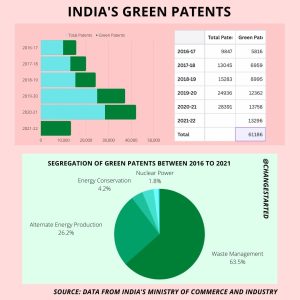Green technologies are set to unleash unprecedented disruption, propelling the Indian economy toward a sustainable future.
In the last few years, India’s green technology ecosystem has been on an overdrive — with many innovative solutions ensuing across sectors – wind and solar power generation, biofuel production, waste management, and electric vehicle manufacturing.
Green innovation is driving sustainability and boosting the Indian economy, and encouraging consumers to use green technology products.
The progress in green technology has also emphasized India’s ranking on Global Innovation Index. India has moved from 81st in 2015-16 to 46th in 2021. Much of this concerns the number of green patents filed by India in the last few years.
Data from India’s Ministry of Commerce and Industry shows that more than 91,500 patents were granted between 2016-17 and 2020-21, most of which are green patents. In another separate data published by the ministry, between 2016-17 and 2021-22 (up to January), 61,186 patents relating to green technologies have been granted.
If we look deeper into the figures – 90 percent of the 61,186 patents related to green technologies – waste management, and alternative energy production – 38,837 or 63 percent are related to waste management, and more than 16,000 or 26 percent are for alternative energy production.
The rest of the green technology patents are for energy conservation (2,555), transportation technologies (2,481), nuclear power generation (1,079), agriculture and forestry (161), and others (69).

Policy Measures are Making Green Innovation in India a Reality
A lot of green innovation in India is also happening because of the Central government’s schemes and incentive programs.
At COP26, India unexpectedly announced a net-zero target by 2070 and some interim targets, including renewable energy and emission reduction targets by 2030. The implementation of these temporary announcements will require significant investments that will extend beyond the power sector.
In February 2022, when the finance minister of India presented the Indian budget, she laid down four priority areas that will aim to steer the Indian economy for the next 25 years. Among them were “Productivity Enhancement & Investment, Sunrise Opportunities, Energy Transition, and Climate Action.“
One of the major announcements in Budget 2022 is about the allocation of Rs 24,000 crore (US$ 3.2 bn) incentives to boost India’s solar energy needs.
Not surprisingly, the world is beginning to recognize India as an attractive destination for renewable energy investments. The substantial investments in India’s green energy system are not only in financial terms but also in terms of knowledge sharing. Several counties have initiated discussions or started working with India on green partnerships.
In 2020, India and Denmark established the Green Strategic Partnership to collaborate on environment-friendly solutions to developmental challenges. Danish companies will bring their expertise in renewable energy, water & waste management, and air pollution to the Indian shores.
Similarly, India, the USA, Japan, and Australia agreed to establish a Climate Working Group (CWG) to promote cooperation on climate action and capacity building for implementing the Paris Agreement on Climate Change. In addition, these four countries (QUAD) will also promote technology transfer and responsible trade practices in emerging technologies, mainly green technologies.
Finally, on the waste management side, India has made remarkable progress since the Swachh Bharat (Clean India) mission was launched in 2014. Most Indian cities today are Open Defecation Free (ODF), and many process their solid waste. The Swachh Bharat mission has slowly turned into a National Movement where citizens have become active participants in cleanliness activities across the country. Not surprisingly, we are seeing a fair share of green innovation in India percolating in the waste management sector.
Wrapping Up
Despite this remarkable progress, India still has much catching up compared to countries like China, the USA, Japan, and Korea. According to the World Intellectual Property Organization (WIPO), the number of patents granted in China, the USA, Japan, and Korea stood at 5.30 lakh, 3.52 lakh, 1.79 lakh, and 1.35 lakh, respectively, for 2020.
Economic growth in the 21st century can only be sustained if policymakers effectively leverage the linkages between technological innovation and green growth.






Add comment